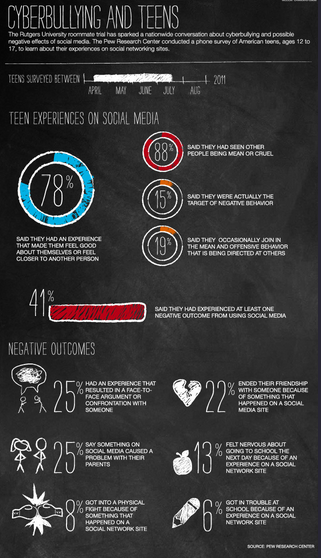The adoption of smartphone among teenagers has significantly increased over the past few years. According to the 2013 Pew Internet study, nearly 80% of American young adults now own a cellular device. One in every four is a heavy internet user who would rather go online on their mobile device than a traditional computer. For academic pursuits, having a portable internet device is indeed very beneficial, since it aids them in their doing homework and research. But how can you ensure that they are not spending too much time with their gadgetries? What about their exposure to restricted online content? As parents, an effective solution to avoid your teens turning tech-obsessed is to set certain mobile boundaries.
How to Tell If Your Child Is Involved In Cyberbullying
Gone are the days when you knew your child was safe because they were home with you. With social media, smartphones, tablets, laptops and wireless Internet everywhere, there is almost nowhere your child can hide if someone wants to bully them. The wonders of our modern age have opened up a whole new world for bullies and victims and the terrain is frightening and dangerous.
View the Newest SlideShare from uKnowKids!
 Check out the SlideShare on uKnowKids's newest eBook, "Back to School Basics for Digital Families." This visually appealing and easy-to-digest SlideShare gives you the basics of our eBook in slide form! If you want the full text and a free Internet and mobile phone safety contract for you and your children to agree upon and sign, download the full eBook here.
Check out the SlideShare on uKnowKids's newest eBook, "Back to School Basics for Digital Families." This visually appealing and easy-to-digest SlideShare gives you the basics of our eBook in slide form! If you want the full text and a free Internet and mobile phone safety contract for you and your children to agree upon and sign, download the full eBook here.
Check Out This Awesome Video for a Little Joy in the Face of Bullies
With all of the tragic news surrounding the tragic suicide of Rebecca Ann Sedwick attributed to cyberbullies, we thought you might need a little joy in your life.
Watch this uplifting video about a brother who wants nothing more but to see the bullies stop messing with his sister.
How to Know and What to Do When Your Child is Being Cyberbullied
This article originally appeared on FoxBusiness.com, writen by Kate Rogers.
Teasing used to be limited to school recess on the playground, but now it has evolved into a malicious trend among youths on the internet.
As technology advances and more children are using it, they are increasingly exposed to cyberbullies on social networking sites like Facebook (FB) and Twitter, and texting and apps on phones and tablets. And the consequences can be devastating. For some children being targeted, like 12-year-old Rebecca Ann Sedwick in Miami, they see no other way out of this cruel cyber world, than to take their own lives.
Think Sexting Can't Land Your Child in Jail? Think Again
This article was originally posted on The Huffington Post.
The trial of a Victoria-area teen who is facing child pornography charges for allegedly texting a nude picture of another girl without her consent will go ahead before a constitutional challenge, a judge has ruled.
Digital Parenting: How to Handle Your Child's Social Media Disaster
Let's hope nothing like what is described below ever happens to your child, but if it does, here is some advice and tips from author, Jason P. Stadtlander. This article was orginally published on The Huffington Post.
In my last article, "Your Child: A Sheep Among the Wolves," I discussed the dangers today's parents are facing with the Internet and child predators. Today, I would like to focus on some of the more daunting questions dealing with what a parent can do when preventive measures are too late.
The case with Hannah Anderson and the Irish 17-year-old that was cyber-bullied after an Eminem concert are prime examples of children and social media run amuck. Anderson should never have had access to electronic devices until she and her family had time to grieve together and the Irish teen... well, I don't even know where to start there.
How Teachers Can Help Create Cyber-Shields for Their Students
Did you catch this article about a theatre teacher explaining how she acts as a cyber-shield for students? It was written by Sue Scheff, author and parent advocate, and originally published on The Huffington Post.
Today's youth are inseparable from their smartphones, computers and social networks. When our kids, especially teens, spread their wings into the world of social media, it's important for them to understand how to be upstanding digital citizens.
Recently, I explained how parents can prepare and educate children on the risks of what lurks online by acting as a cyber-shield. However, parents aren't the only role models in a child's life. Teachers must be active participants in teens' digital lives. According to the Cyberbullying Research Center, students were less likely to bully others or send sexts if their teachers held discussions regarding responsible online and cell phone conduct.
Cyberbullying: When Parents Fail
Check out this article and perspective from child and adolescent psychotherapist and parenting expert, Katie Hurley.
No one wants to judge another parent. Or a group of other parents, for that matter. No, the call to end judgment among parents has been loud and clear for quite some time now. You can lose days of your life reading posts and articles on this very topic, if you so choose.
All families are different. We all have our own challenges. We all face our own stressors.
True. True. And true, again.
Download uKnowKids' Newest eBook Now!
Your child has likely started back to school, which means new pens, pencils, binders and textbooks, but it also means new opportunities for digital dangers and threats. Is your child prepared to handle the back to school battle of juggling technology and learning? Are they prepared to combat cyberbullying or sexting pressures?
Anti-Bullying Rules Announced by Ireland's Department of Education
A big win for cyber-bullying prevention in Ireland happened a few days ago. Read the excerpt from the original post by the Irish Examiner.
Cyber-bullying, homophobic and racist bullying all form part of the Department of Education's new anti-bullying measures.
All primary and secondary schools will have to adopt an anti-bullying policy by no later than the end of term next Summer.
Teachers will be responsible for recording bullying incidents and, where necessary, contacting the parents of the pupils involved.
The Irish Society for Prevention of Cruelty to Children has welcomed the measures.
"Online bullying is very prevalent and it's certainly something we would like to address and it's been mentioned within the procedures by the Department of Education," said Andrew Jackson, national anti-
"I Was Jailed for Cyberbullying"
Read the account from the first British person to be jailed for cyber bullying She speaks of her regret at posting a death threat online.
Keeley Houghton, 18, was sent to a young offenders' institute for three months in 2009 after writing on a social networking site that she was going to "murder" a fellow teenage girl.
The incident happened after an ongoing feud with Keeley's victim. Keeley said she she attempted to apologize to the girl on the night before she posted the message, but says her victim wouldn't listen.
"It was understandable, but I was so angry, even through to the next day," Keeley recalled on This Morning today (12 September).
"I was sat with a friend at my house and I wrote what I wrote. I don't even know what I was thinking. I didn't think she would see it. I wasn't friends with her on the social networking site."
Keeley, who is now a reformed character, removed the message within 24 hours and explained: "I knew it was wrong. I thought about it and thought, 'No, I shouldn't have written it'. So I just took it down.
"I don't know why I said it. It wasn't a threat I was going to go through with, it was just something I wrote at the time."
Girl, 12, Jumped to Death After 18 Months of Cyberbullying
Read about this terrible story of a young tween that took her life after months of relentless cyberbullying.
Are People Being Cyberbullied on Twitter?
It seems that the bullying, harassment and abuse that occurs on the social networking platform Twitter, one of the most popular social networking platforms in the world that’s meant to bring people together, has sadly become a common occurrence – it’s expected. As bad as the abuse has been over the past several years, it also seems that it’s escalating these days with racism, bomb threats, sexual and violent threats against women, etc.
Twitter has had a system in place to reduce bullying and harassment, but it’s just not effective and doesn’t work. The current system in place allows users to fill out a “report abuse” form, but this clearly doesn’t work. We see the abuse every day on Twitter. You don’t have to look hard to find it, all you have to do is click on something that’s currently trending or receiving negative feedback in the news and you’ll see massive amounts of profanity, bullying and threats.
New Research: Online Predators Not Distinctly Dangerous Sex Offenders
Check out this very interesting study done by the University of New Hampshire on the dangerousness of online predators. What are your thoughts?
Original article taken from Fosters.com.
A new University of New Hampshire study challenges the view that online predators are a distinctly dangerous variety of sex offender, requiring special programs to protect youth.
The study from the UNH Crimes against Children Research Center finds that sex offenders who target teens increasingly use Internet and cell phone communications to lure teens into sexual relationships. In crimes that involve such communications, offenders who meet and recruit youth online operate in much the same way as offenders who meet and know youth in ordinary offline environments.
Smart Surfing: A Student's Guide to Online Etiquette
Check out this helpful article of online etiquette for teens and tips for parents from the Sooke News Mirror.
Fact: The Internet is here to stay.
Fact: So is cyberbullying.
Ironically (and most helpfully), the Internet is a great source on how to deal with cyberbullying.
StopABully.ca offers up the following statistics on cyberbullying:
-
Ninety per cent of parents are familiar with cyberbullying.
-
Seventy-three per cent of parents are concerned about it.
What Teens are Really Saying About Cyberbullying -- Infographic
Check out this great infographic from HLN's Generation Overshare, a great section for all things digital parenting.
Teen Sexting Criminalized by States
Here is some great information about current laws in US states in regard to sexting from the blog at Lawyers.com.
States continue to outlaw sexting by teens – to each other or to adults – even as it grows more popular among them.
The Problem of Permanence
Teachers "Friending" or Following Students to Prevent Cyberbullying?
Cyberbullying is a growing problem among children, but the effects can last much longer than the event itself. Once something goes online, it can be almost impossible to take it down...and humiliation can follow a child for the rest of their life. However, some teachers are turning to a new method of watching and controlling things: "Friending" or following their students.
The keystone of this strategy is the fact that social media sites, by design, are intended to share information with a particular group of people. This can be as small as a Tweet group of friends or as long as an essay re-published to thousands of people with one click of a button. However, as easy as it is to follow students, following the bullies with the intention of stopping their behavior is not the best strategy for preventing cyberbullying, even if teachers are the ones doing it.
Personalized Pornography: The Explosive Growth of Sexting Among Teens
The embarrassing political troubles of the unfortunately but aptly named former Congressman Anthony Weiner has catapulted the term “sexting” into cultural consciousness once again, prompting a sudden discussion on what, exactly, “sexting” is—and whether we should be worried about it. Dr. Keith Ablow, FOX News’ psychiatry expert, weighed in with a column entitled “What Weiner’s sexting scandal tells us about young women today,” concluding that it tells us that too many women are not having Private Part Pinups texted to them against their will. Rather, Ablow writes, “I can tell you that the average young woman no longer balks at sexting, watching pornography, or being the aggressor sexually in a relationship.” Slate.com noted that while the rates of boys and girls sexting—specifically, sending nude pictures of themselves—are pretty much the same, boys are far more likely to send these pictures on to their peers, resulting in often savage bullying that has culminated in tragedies like the recent suicides of several young girls. While Monsieur Weiner’s recurring predicaments have prompted a lot of snickering from the media, the “sexting” problem in general has become decidedly unfunny.
















